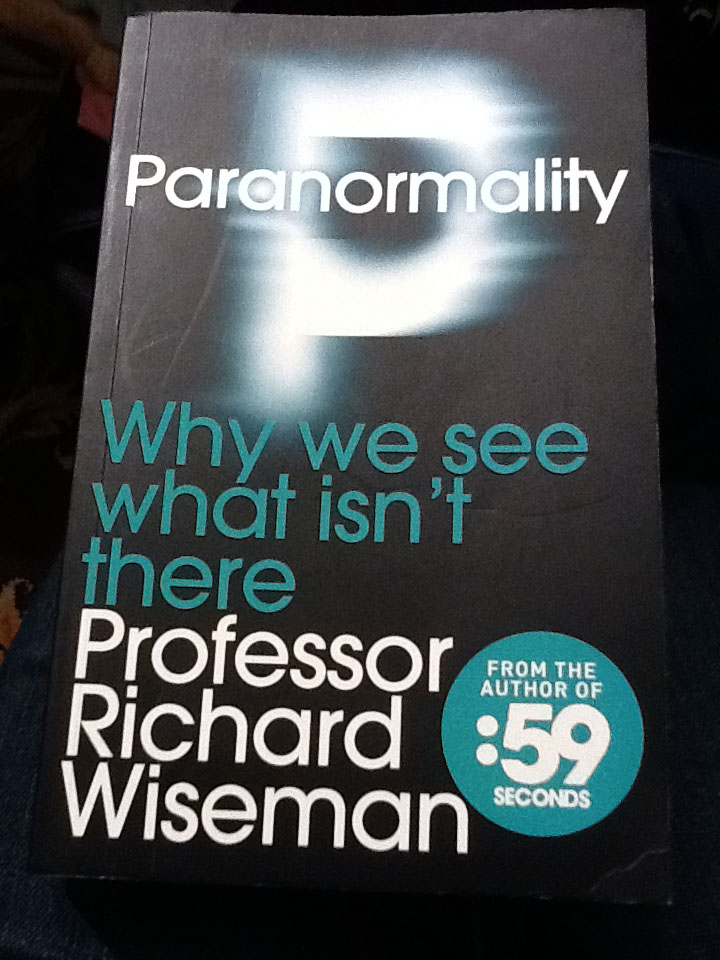Paranormality: History, Psychology, and Talking Rodents

The other day I received a book in the mail – it was Paranormality, the latest offering from my friend, Richard Wiseman. I was very excited, because I was on my way to the used bookstore and could use the trade-in value of an unopened book. Unfortunately, I noticed that he had signed it already, thereby cleverly diverting my plans and forcing me to read the thing. Well! I’m glad I did.
I’m often asked by friends and readers to recommend books for those who are just getting into skepticism. The list rarely changes: there’s Sagan’s Demon-haunted World, Shermer’s Why People Believe Weird Things, and for an excellent overview of the way a magician sees things there’s Randi’s FlimFlam.
The only problem with the latter is that the new, possibly unconvinced skeptic may wonder what has happened since 1982. Even Demon-haunted World is now 16 years old, and Why People Believe Weird Things is 14 (though I believe the revised and expanded edition is 8 years old).
Paranormality is very much like the update to Flim-Flam I’ve always wanted, with additional psychological tidbits that, like Shermer’s classic, provide insight into why humans can be so easy to fool sometimes. Wiseman’s background as a magician, a psychologist, and an all-around amusing person serves the book well
The book covers a range of weird topics such as psychics, out of body experiences, ghosts, and prophesy, with a mix of solidly researched history, recent scientific evidence, and tales of Wiseman’s own paranormal investigations involving telepathic dogs and shady gurus.
There also plenty of shout-outs to other researchers, providing a great list for the reader who wants to explore further: Ray Hyman, Barry Beyerstein, Joe Nickell, Sue Blackmore, and of course the Amazing Randi all get love.
For those who have read books like Flim-Flam and followed Wiseman’s career for awhile, some of the book will be familiar territory. I imagine most readers of this site understand cold reading, the Clever Hans effect, and change blindness, for instance. But even I, in my nearly infinite knowledge of all things sceptical (stay with me), found a good deal to discover in Wiseman’s rich retelling of the history of hoaxes, scams and pseudoscience.
For instance, I wasn’t previously familiar with Harry Price, who Wiseman calls a ghost-hunter extraordinaire and personal hero of his. The book lays out Price’s investigation of Gef, the remarkable talking mongoose. “Perhaps rather gratuitously,” Wiseman, writes, “Gef explained that he was quite unlike a normal mongoose.”
Paranormality is a great read for skeptics, and possibly an even better read for that friend or family member you haven’t yet managed to talk into coming to your local Skeptics in the Pub. I, for one, have decided to keep my copy after all.





If Dr. Wiseman wrote it, I’ll buy it.
The tone of Dr. Wiseman’s books are always playful and fun. One gets the feeling that he simply loves how infinitely weird human behavior can be. It can be a nice change of pace from Randi’s avuncular curmudgeonly exasperation or Sherman’s exacting didacticism. Carl Sagan is still my favorite, though.
I hand out Wiseman’s “60 Seconds” to friends whom I think would be open to scepticism. That book usually instills a sense of trust and credibility. If they like it, I point out his other books and videos. The doorway to their minds having thus been unlocked, they are ready for some real critical thinking.
“Gef explained that he was quite unlike a normal mongoose.” — Hmmmm, I’m not sure I believe you, Gef.
In any case, I’ve been looking for something new for the Kindle. On it.
I have just ordered my copy, I will eventually get around to reading it once I have listened to the rest of the SGU podcasts. I am currently up to episode 197 so I only have another 150 hours (give or take a few minutes) to go :)
I just read in the Australian Skeptics magazine that you guys, Randi and Brian Dunning were out here in Oz. Dam it, I would have loved to see you all in person. I discovered I was a skeptic too late to be aware of the Aussie TAM.
You can be sure if you ever get to Oz again I will be there. I will probably get to a TAM in the US before then though.
Because it had to be said, Mongooses aren’t rodents.
No new skeptic books? Maybe because stupid doesn’t get any smarter?
What has happened since 1982? Lots. In fact, the whole field of skepticism has exploded since then, with plenty of fantastic reads coming out, from great writers, with lots of knowledge, eager to share.
.
Dawkins has churned out book after book. Mark Edward has done the same. Shermer, too. Then, there’s Eugenie Scott, Bob Carroll, Ben Radford, Kendrick Frazier, Joe Nickell, Philip Klass, Paul Kurtz, to name but a “few”. Some people need sleep, others write books.
.
Of course, just because something is not new does not mean it does not have value. Just think of Harry Houdini’s “Miracle Mongers and their Methods”, Martin Gardner’s “Fads and fallacies”, Schick/Vaughn’s “How to think about weird things”, James Frazer’s “The Golden Bough”, and Charles MacKay’s “Extraordinary Delusions and the Madness of Crowds”.
.
I should not leave out Ray Hyman, Terence Hines or Victor Stenger, so I won’t. Others? Gee, not enough time.
.
Also, look for local writers. My own turf offers classics such as Alfred Lehmann’s “Overtro og Trolddom” (“Superstition and Wizardry”). Yes, a hundred years ago, yet still a fantastic source of knowledge and insight. You check your own ‘hood, and you’ll find gold.
.
Happily, “when to stop” seems like a bigger problem these days than “finding good reads”. Bottom line: There is a ton of fantastic material, and more comes in, almost daily. Wiseman’s book is certainly a worthwhile addition to the growing list of Great Reads.
Strange that he has been unable to find an American publisher. You’d think with the skeptical community there would be a base of people guaranteed to buy such a book.
It was refused by American publishers apparently, but you can get it on Kindle or just order it from Amazon.UK.
-Christian
Actually, you can get the UK print version directly from Amazon US, too.